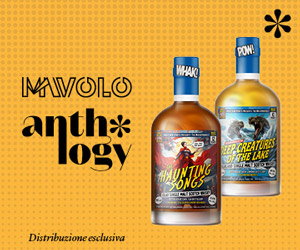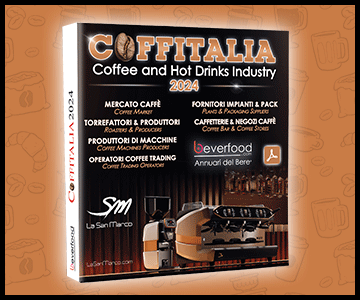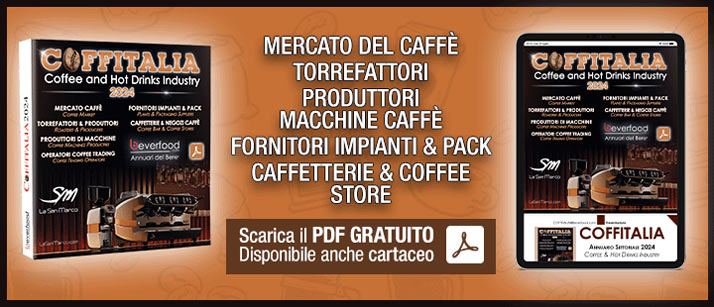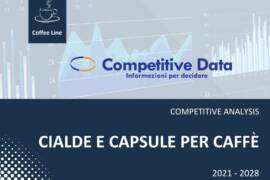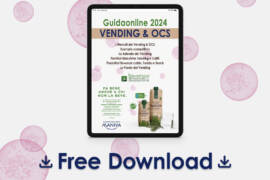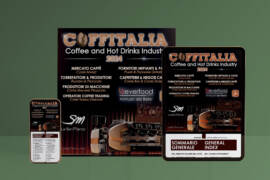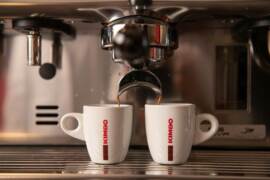Spreafico Automation, azienda di riferimento nell’ambito della progettazione, costruzione e commercializzazione di sistemi per il riempimento e confezionamento per il settore del caffè, ha in essere una partnership con il Dipartimento di Scienze per gli Alimenti, la Nutrizione e l’Ambiente (DeFENS) dell’Università degli Studi di Milano per lo studio delle proprietà delle capsule autoprotette e del ruolo delle atmosfere protettive nel corso della shelf life. Si tratta di un caso virtuoso di collaborazione tra mondo accademico e produttivo, in grado di contribuire all’avanzamento tecnologico nel settore del caffè porzionato.

I protagonisti: Spreafico Automation e l’Università degli Studi di Milano
L’Università di Milano partecipa al progetto con un team di ricerca dotato di competenze specifiche nell’ambito del packaging per il settore Food, che viene coordinato da Sara Limbo, professoressa associata presso il dipartimento “DeFENS” (Dipartimento di scienze per gli alimenti, la nutrizione e l’ambiente). DeFENS è una realtà che è solita lavorare in partnership col mondo produttivo, gestendo progetti che da un lato possano contribuire al progresso scientifico e dall’altro abbiano ricadute positive per l’industria. Dal canto suo Spreafico Automation ha fornito una piattaforma per lo sviluppo degli studi: una vera e propria macchina automatica che, come da tradizione, è stata progettata ed allestita all’interno degli stabilimenti di Calolziocorte (LC) ed è stata configurata in modo da rispondere appieno alle specifiche del team di ricerca universitario. L’azienda sostiene inoltre il progetto con un contributo economico, potendo per contro fruire in forma esclusiva dei risultati degli studi, coperti da clausole di riservatezza. Spreafico Automation, che può già vantare una grande esperienza nel settore, acquisirà quindi un know-how unico nel contesto delle capsule autoprotette e dei comportamenti che queste hanno a seconda della loro tipologia e delle diverse condizioni di utilizzo. All’atto pratico, questo si tradurrà nella possibilità di poter orientare al meglio il cliente, con un bagaglio di conoscenze che nessun altro competitor è in grado di offrire. Lo spettro delle competenze acquisite sarà tale da poter offrire benefici tanto alle piccole/medie torrefazioni quanto ai grandi gruppi.
Modalità e procedure di ricerca
Il progetto, che ha preso il via nell’estate del 2018, prende in considerazione le capsule autoprotette, quelle cioè che non necessitano di un sovra-imballo ma posseggono già caratteristiche di barriera tali da garantire la shelf life del prodotto, comunemente utilizzate all’interno della pletora di sistemi in circolazione (“Nespresso”, “A Modo Mio” etc.), sia in ambito consumer che Ho.re.Ca. Si tratta del comparto del settore caffè in maggior espansione, che ogni anno fa registrare una crescita esponenziale in tutto il mondo occidentale. A titolo esemplificativo, secondo i dati divulgati da Iri nel 2017 sul solo mercato italiano l’ambito delle capsule (auto-protette e non) ha fatto segnare +18,8% in valore e +20% in volume. Il progetto è attualmente nel pieno del suo svolgimento e prevede una serie di studi correlati, risultando pertanto non soltanto complesso, ma anche suscettibile di “modifiche in corso d’opera” per adeguare il metodo di ricerca a quelle che sono le problematiche via via riscontrate. Per avere un’idea di quanto lo studio sia articolato, basti pensare che tra i vari elementi che sono oggetto dell’analisi vi sono i materiali plastici utilizzati per la realizzazione della capsula, le miscele di gas che vengono impiegate per realizzare il vuoto all’interno della stessa, la tipologia e la caratteristiche delle macchine per il confezionamento che vengono impiegate e, ultima ma non ultima, la qualità del macinato stesso, che nelle sue diverse varietà può avere caratteristiche che vanno a influenzare in maniera sensibile il comportamento del sistema / capsula. La fase preliminare ha previsto un’analisi comparativa delle diverse tipologie di capsule attualmente utilizzate sul mercato, che sono state esaminate valutando parametri quali la stratigrafia delle strutture plastiche utilizzate, l’evoluzione dei gas di confezionamento e le interazioni del sistema complesso caffè-capsula- ambiente nel tempo, per comprendere le modifiche sensoriali e qualitative del caffè.
Gli orizzonti dell’innovazione nel settore della capsula
Lo scopo è quello di arrivare a definire come le interazioni tra tutti questi elementi influiscano sulla qualità del prodotto finito, così da conoscere e creare le condizioni per ottenere un confezionamento in capsula ottimale. Al di là degli aspetti economici o legati alla ricerca, ci sono altri temi correlati al progetto che possono avere ricadute benefiche sul settore del caffè porzionato e sull’ambiente stesso. Comprendere come ottimizzare non soltanto le fasi di riempimento e confezionamento, ma la composizione e la preparazione stessa della capsula, può infatti avere un impatto fondamentale, particolarmente in un periodo in cui il comparto risulta “sotto esame” con accuse – più o meno fondate – in merito agli impatti ambientali di queste soluzioni. La riduzione dello spessore dei materiali o la possibilità di garantire il mantenimento della corretta atmosfera all’interno di un sistema complesso come la capsula, porterebbero infatti ad una flessione dell’impatto ambientale generato non solo dall’immissione di materiali nell’ambiente, ma anche dalle perdite di prodotto, aspetto che il più delle volte si sottovaluta. Dati oggettivi dimostrano infatti che, nel settore alimentare, le perdite di prodotto causate da una inadeguata protezione rappresentano una delle voci di impatto più importanti. Uno studio come quello condotto da Spreafico e dal DeFENS può quindi portare a vantaggi lungo tutta la filiera di produzione e distribuzione di caffè in capsula.
La partnership tra Spreafico Automation e l’Università di Milano è nata grazie a Gianfranco Zanarini, titolare di Sepack; una realtà commerciale specializzata nell’allestimento di linee di confezionamento per il settore del caffè. Sepack, da tempo partner di Spreafico Automation, ha supportato l’incontro tra i due partner agevolando lo sviluppo dello studio in essere, nella convinzione che questo sarà in grado di portare concreti benefici non soltanto alle realtà coinvolte ma alla filiera stessa.
Spreafico Automation entra nel gruppo IMA
Lo scorso febbraio, IMA ha sottoscritto un accordo per l’acquisto del 70% del capitale della società Spreafico Automation S.r.l. La società, basata a Calolziocorte, Lecco, e detenuta dalla famiglia Spreafico, è un importante player nella progettazione, produzione e commercializzazione di macchine automatiche per il riempimento e la preparazione delle capsule di caffè (single serve) e prodotti solubili. Questa acquisizione rappresenta un significativo rafforzamento del Gruppo IMA nel settore del caffè, un mercato previsto in decisa crescita nei prossimi anni. A questo si aggiungeranno le sinergie commerciali e produttive attese dall’integrazione della società acquisita nella rete commerciale e nel sistema di subfornitura del Gruppo IMA.
+Info: – www.spreafico-srl.com
Spreafico Automation and University of Milan join forces for a research project on coffee capsules
Spreafico Automation, a leading company in the designing, building and marketing of filling and packaging systems for the coffee industry, has established a partnership with the Dipartimento di Scienze per gli Alimenti, la Nutrizione e l’Ambiente of Università degli Studi di Milano (University of Milan’s Department of Food, Environmental and Nutritional Sciences) for the study of the properties of self-protected capsules and the role of protective atmospheres in the shelf life. It is a mutually beneficial collaboration between academia and industry, which could contribute to technological advancements in the portioned coffee market.
The protagonists: Spreafico Automation and Università degli Studi di Milano
The research team from the University of Milan that takes part in the project is directed by the associate professor in the Department of Food, Environmental and Nutritional Sciences (DeFENS), prof. Sara Limbo and will be able to apply their experience and knowledge in the field of packaging for the food industry. DeFENS is not new to partnerships with the production sector, having led projects that would contribute to the scientific progress and, at the same time, would yield positive results for the industrial world. For its part, Spreafico has provided a platform to develop the study: a fully automated machine that, as usual for the company, has been designed and built in its plant in Calolziocorte, Lecco, and has been configured to fully meet the requirements of the university research team. The company supports the project with a financial contribution as well, being able to take advantage of the study’s results, which are covered by confidentiality clauses. Spreafico Automation, a company that already has a profound experience in the industry, will be able to acquire a unique know-how in the field of self-protected capsules and in their behavior according to type and different use conditions. In practice, this means they will be able to better orient the customer, with a deeper knowledge than any other competitor on the market. The know-how acquired by the company will be beneficial to both small-medium roasters and big groups.
Research methods and procedures
The project, which started in the summer of 2018, takes into consideration self-protected capsules, those that do not need an exterior packaging but already have a barrier that ensures the product’s shelf life and are commonly used in a wide variety of systems in the market (“Nespresso”, “A Modo Mio” etc.), both by end users and by the Ho.re.Ca. industry. It’s the coffee sector with the biggest growth, it shows an exponential increase in sales every year throughout the western world. Just as an example, according to data shared by Iri in 2017, the capsule industry (both self-protected and standard) has registered an 18.8% increase in value and 20% in volume, and this is just on the Italian market. The project currently being carried out contemplates a series of related studies, which means it is not only complex, but could also be subject to changes in order to adjust the research method to any issues that might be encountered along the way. To get a full idea of the complexity of the study, it is important to note that among the different elements that are being analyzed are the plastic materials used for making the capsule, the gas mixtures employed for the vacuum inside the capsule, the type and features of the packaging machines that are used and, finally, the quality of the ground coffee, that in its different varieties might possess characteristics which produce a notable impact on the behavior of the system / capsule. The preliminary phase has included a comparative analysis of the different capsule types currently on the market, which have been examined by evaluating parameters such as the layers of the plastic structures employed, the evolution of the packaging gases and the interaction of the complex system coffee-capsule-environment in time, to understand the sensory and qualitative changes of coffee.
Future innovations in the capsule industry
The aim is to be able to define how the interactions of all of these elements affect the quality of the finished product, so as to be aware of and create the conditions for an optimal capsule packaging which guarantees the fragrance of the coffee produced but also a shelf life that is as long as possible. In addition to the financial and research aspects, other topics have been covered by the project that could yield beneficial results for the portioned coffee industry and for the environment. Understanding how to optimize not only the filling and packaging phases, but also the composition and preparation of the capsule, could have a big impact, especially now that the sector is facing several accusations, whether rightly so or not, based on the environmental impact of these solutions. For instance, a reduction in the thickness of the materials used or the ability of ensuring that the correct atmosphere inside a complex system such as the capsule is being maintained, could lead to a potential reduction in the environmental impact generated not only by the release of materials in the environment, but also by the loss of product, an aspect which is often underestimated. Objective evidence, on the contrary, shows that, in the food industry, the loss of product caused by an inadequate protection play a big role in the overall environmental impact of the sector. The advantages of a study such as the one Spreafico and Defens are conducting could lead to benefits for the whole production and distribution chain of coffee in capsules.
The partnership between Spreafico Automation and the University of Milan was started with the help of Gianfranco Zanarini, the owner of Sepack, a company specialized in the fitting of packaging lines for the coffee industry. Sepack, a longtime partner of Spreafico Automation, has supported the meeting between the two partners, helping also in the development of the current study, being firmly convinced it is going to lead to concrete benefits not only for the companies involved in it but also for the whole supply chain.
Spreafico Automation becomes part of the IMA Group
At the end of February, IMA has signed an agreement to buy 70% of Spreafico Automation S.r.l. The company, based in Calolziocorte, Lecco, and owned by the Spreafico family, is an important player in the design, production and marketing of automatic machines for filling and preparing single-serve capsules for coffee and other soluble products. This acquisition significantly strengthen the IMA Group’s presence in the coffee sector, a market that is expected to grow strongly in the coming years. To this will be added the commercial and production synergies expected from integration of that company with the IMA Group’s sales network and sub- contracting system.
+Info: – www.spreafico-srl.com
